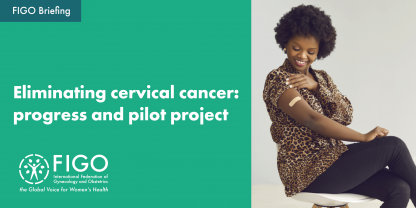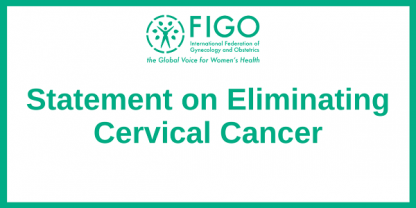Project to Eliminate Cervical Cancer
A pilot project to investigate the feasibility of supporting implementation of strategies, as advocated by WHO, for increasing vaccination against HPV and engagement of women with cervical screening
Project leads: Professor Sean Kehoe, Past Chair and current member of the FIGO Committee on Women's Cancer; Professor Joanna Cain, Past Chair and current member of WHO Guidelines Development Group (GDG) for elimination of Cervical Cancer; Professor Neerja Bhatla, member of FIGO Committee and WHO GDG; and Professor Mary Ann Lumsden, CEO FIGO
Project Contact: Francesca Hearing
Introduction and context
Each year over 500,000 women are diagnosed with cervical cancer, and over a quarter of a million die. More than 85% of these deaths occur in low- and middle- income countries and it is estimated that this will rise to 95% over time. Most LMICs do not have access to cervical cancer screening programmes or robust HPV vaccination, and the majority of women in these countries present with advanced disease not amenable to surgery.
The WHO, along with FIGO and many global partners, now sees a path to the eradication of this deadly disease through an emphasis on vaccination and screening. However, gaps exist in both professional and community education, sustainability of prevention strategies, and coordination of implementation in-country.
Strategies targeting Cervical Cancer
In-country implementation and education targeting cervical cancer elimination must focus on two key elements:
Primary prevention: The high efficacy of HPV vaccine in preventing pre-invasive disease is accepted as the best primary preventative strategy and has been identified by WHO and other global health leaders as the key for future elimination. A successful vaccination programme depends upon political support, education, infrastructure, knowledge and training, plus support from and collaboration with other organisations.
Screening: The value of screening by cervical smears, HPV testing or other means are also major contributors to the reduction in cervical cancer. Research shows variable efficacy with a wide range of screening strategies. Implementation of the most efficacious strategy for the country or region is the goal, whether increasing access or shifting strategy to cover more women.
Three quarters of women in LIC will present with advanced disease (stage 3 and 4) invasive cervical cancer without surgical options and limited access to chemo-radiotherapy or palliative care. Given these limited treatment options, prevention, whether primary or screening, is a priority in order to eliminate cervical cancer.
Project Details
FIGO is supporting the development of evidence-based models on successful collaborative structures to facilitate the sustainable implementation of the WHO evidence-based guidance for vaccination and screening. The project has three key aims:
Aim 1: Identify common educational and professional gaps impacting the implementation of present HPV vaccination strategies though experience in select low-middle income countries
Aim 2: Develop reproducible projects working with FIGO National and/or regional organisations that target collaboration/education/facilitation of introducing a vaccination programme where none exists and/or addresses underlying educational or professional gaps that have hindered roll out of programs.
Aim 3: The countries, represented by their national society, will expand the knowledge of addressing diverse issue for implementation globally with special but not exclusive interest in non-GAVI LMICs.
The project is currently in its first phase, assessment and design, which will be followed by initial implementation.
Assessment and Design Grants
Individual researchers, organisations and FIGO Member Societies were invited to apply for funding in order to identify and provide an assessment and design proposal in response to in-country gaps in vaccination and screening. Following evaluation by FIGO’s Committee on Women's Cancer, a total of five successful grant applicants from across the globe were selected to receive project funding. More information about the projects can be found below:
Colombian Federation of Obstetrics and Gynecology (FECOLSOG), Colombia – Implementation of screening and prevention of cervical cancer
Cervical cancer is the third-most common neoplasia in women in Colombia, accounting for nearly 50 deaths every week. Since an incident near Cartagena harmed trust in the HPV vaccine in 2014, vaccination rates have dropped considerably. To catch up with the global strategy to accelerate the elimination of cervical cancer, the project aims to reduce educational gaps that hinder HPV vaccination among teenagers, as well as screening in adult women. Over at least 36 months, the project will centre on a holistic approach, consisting of an educational programme that encourages different interest groups to interact with each other and to learn about the prevention of cervical cancer.
The Bengal Obstetric and Gynecological Society (BOGS), India – Integration of Smartphone in cervical cancer screening and Vaccination with Education dissemination (i–SERVE)
This project is currently on pause due to changes in vaccine supply in the region, however the development of the mobile application began in early 2022 and is ongoing.
This project aims to integrate mobile application technology with cervical cancer screening and HPV vaccination, with a particular focus upon the feasibility and acceptability of the app in rural areas. The app, available in local languages, will support individuals with HPV self-sampling, assess vaccine eligibility, record screening and vaccination data, and will also send SMS reminders for vaccination and screening appointments. The app will also support healthcare providers to set up appointments, enabling a “screen, see and treat” approach. If found feasible and acceptable by this study, the app will be available for use on a larger scale.
End Cervical Cancer Nigeria Initiative (ECCNI), Nigeria – Capacity Building for Outpatient Clinics to Improve Adolescent Vaccine Uptake and Women’s Demand for Cervical Cancer Screening
This proposal aims to encourage HPV vaccination uptake among adolescents in Nigeria, while at the same time encouraging eligible women to seek cervical cancer screening. The project will use information, communication and education (ICE) approaches with outpatients as a vehicle for promotion. Selected gynaecologists, spread across the 36 states of the Federation and the Federal Capital Territory, will be trained in social behaviour change communication skills relevant to the HPV vaccination campaign. They will subsequently be asked to institute patient enlightenment programmes in their respective clinics. The results will be used for advocacy to both federal and state ministries of health for national and state-wide scale-up of best practices.
The Federation of Obstetric and Gynaecological Societies of India (FOGSI), India – Augmenting Cervical Cancer Elimination Effectively in a Region utilizing Affordable TEchnology (ACCELERATE) to enhance cervical cancer screening services for achieving WHO Target goals in the North East Region of India
The North Eastern Region (NER) of India bears a huge burden of cervical cancer. Effective implementation of already available guidelines and screening services remains a daunting challenge. This study is designed to assess the feasibility and efficacy of a multi-pronged approach consisting of HPV testing with an option of self-sampling, portable colposcopy and treatment in the same sitting for strengthening the elimination targets in the region. Additionally, it aims to develop a prototype for aligning effective and sustained screening practices. The current study is likely to provide an overview of existing barriers to screening services and impact of a novel strategy for effective screening practice and promoting participation.
Nepal Society of Obstetricians and Gynaecologists (NESOG), Nepal –Implementation of screening and prevention of cervical cancer
This project will generate evidence and identify key gaps in the prevention of cervical cancer in Nepal and outline a roadmap for sustainable solutions. The gaps will be explored across various levels of the health system from policy to health facilities. The project will also explore understanding across the education sector, such as medical colleges, nursing schools and high schools. Findings will be triangulated through robust analyses and disseminated through a national consultative meeting with key stakeholders to initiate dialogue and further advocacy. The meeting will also incorporate a workshop to identify how to effect policy change and incorporate cervical cancer screening and HPV vaccination as part of national programmes.
Initial Implementation Grants
Based on successes, needs, and available funds, initial implementation grants may be subsequently available to enable grantees to secure sustainable implementation of the project.
In the longer term, FIGO will support and work with WHO to implement their guidelines and to increase uptake of vaccination and screening programmes. The WHO revised evidence-based guidelines are being launched in the near future, offering FIGO and our member societies the opportunity to demonstrate the added value we bring to the implementation work with deep and expansive reach into the gynecological community.




